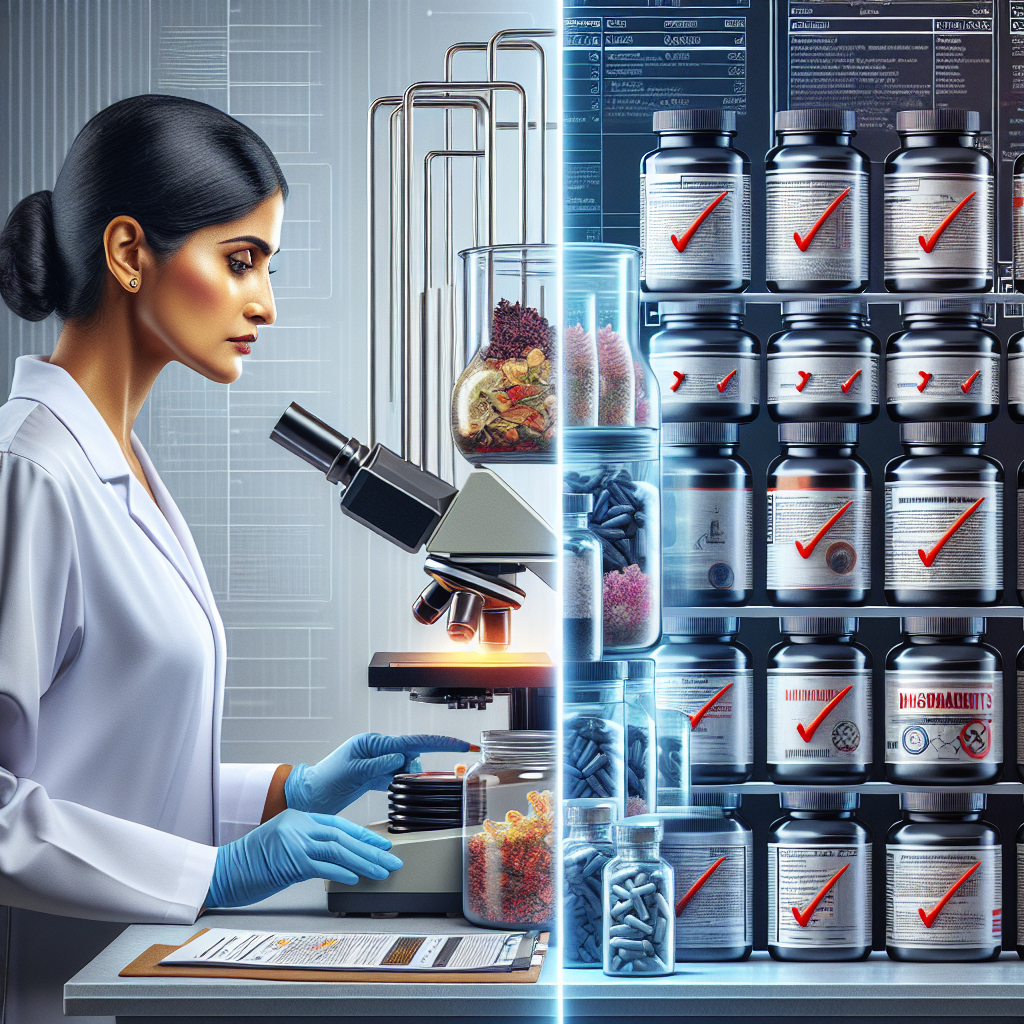Picture this: You’re standing in the supplement aisle, squinting at a bottle of fish oil that promises the moon and stars for your heart health. You think to yourself, “Does this stuff actually contain what the label says?” Well, my friend, you’re not alone in your skepticism—and there’s an entire industry of lab-coat-wearing detectives working behind the scenes to answer that very question.
Welcome to the fascinating world of consumer labs, where dietary supplements go to either prove their worth or face the walk of shame. It’s kind of like “America’s Got Talent” for vitamins, except instead of Simon Cowell, you’ve got scientists with really expensive machines delivering the verdicts.
For forward-thinking manufacturers and product developers in the nutritional space, understanding these testing processes isn’t just interesting trivia—it’s crucial business intelligence. After all, today’s consumers aren’t just swallowing pills and promises; they’re demanding proof that what they’re putting in their bodies actually matches what’s on the label.
The Sheriffs of Supplement Town: ConsumerLab.com and Regulatory Background
While the FDA regulates dietary supplements, they don’t typically test products before they hit shelves. It’s like having traffic laws but not enough cops—which is where third-party testing organizations like ConsumerLab.com enter the picture, wearing metaphorical sheriff badges and carrying very real mass spectrometers.
Founded in 1999, ConsumerLab.com has become the supplement industry’s equivalent of that one friend who always fact-checks everything at dinner parties—sometimes annoying but ultimately invaluable. They’ve built their reputation on rigorous testing standards that make boot camp look like a spa day.
“We’ve seen it all,” a ConsumerLab representative might say. “Probiotic supplements with fewer living organisms than a clean kitchen counter. Omega-3 products that are basically expensive fish-flavored vegetable oil. Multivitamins that should really be labeled ‘Multi-maybe-vitamins’.”
For supplement manufacturers, having your product tested by consumer labs is a bit like sending your child to their first day of school—you’re proud, nervous, and secretly hoping they don’t embarrass you in front of everyone. The difference is that instead of a report card, failing products get publicly listed on databases that consumers actually read.
Under the Microscope: The Testing Process Revealed
So what actually happens when consumer labs get their hands on your supplements? Buckle up, because it’s more intense than the season finale of your favorite detective show.
First comes label scrutiny so meticulous it would make a copy editor blush. Every claim, ingredient, and suggested serving size gets analyzed. Does the product claim to contain 500mg of calcium? That’s going under the microscope—literally. Is there a “proprietary blend”? Consumer labs will be eyeing that with the suspicion of a cat watching a mysterious paper bag.
Next comes the potency verification—the moment of truth for any supplement. Using sophisticated technologies like high-performance liquid chromatography (HPLC) and inductively coupled plasma mass spectrometry (ICP-MS), consumer labs measure whether your product contains the amounts of active ingredients it claims. It’s like catching someone who claims to be 6’2″ standing next to an actual measuring tape—there’s nowhere to hide.
“We once tested a vitamin D supplement that claimed to have 5,000 IU per capsule,” a lab technician might chuckle. “Turns out it had more like 500 IU. That’s not a rounding error—that’s a missing zero!”
Then comes the contamination check, where consumer labs channel their inner detective to search for unwanted guests. Heavy metals like lead and mercury, harmful microbes, pesticides, and even undeclared pharmaceutical ingredients all get flagged. It’s essentially a very scientific version of “What’s in the box?”, except what’s in the bottle really matters for consumer safety.
For health-conscious product manufacturers, this testing process shouldn’t induce panic—it should inspire confidence. After all, knowing your products can withstand this level of scrutiny is the nutritional equivalent of your smartphone surviving being dropped in water. It’s a mark of quality that sets you apart in a crowded marketplace.
The Moment of Truth: Quality Certification Programs
Many consumer labs, including ConsumerLab.com, offer Quality Certification Programs where supplement companies can voluntarily submit their products for testing. It’s like volunteering for a tax audit—who does that? Smart companies who know their products are legitimate, that’s who.
The certification process creates suspense worthy of a reality TV show finale. Will your carefully formulated supplement pass with flying colors or face public humiliation? Manufacturers wait with bated breath as their products undergo the testing gauntlet.
“I’ve seen grown executives refresh their email every 30 seconds waiting for test results,” jokes an industry insider. “It’s like watching someone wait for college acceptance letters—complete with the occasional stress eating.”
When products do pass, they earn the right to display certification marks on their packaging—the nutritional equivalent of a medal of honor. For consumers scanning crowded supplement shelves, these little emblems serve as shortcuts to quality, separating the wheat from the chaff (or in supplement terms, the genuine turmeric from the colored sawdust).
Beyond The Label: Safety and Effectiveness Testing
Consumer labs don’t just verify what’s in the bottle—they also investigate whether supplements dissolve properly. Because let’s face it, a calcium tablet that’s as dissoluble as a small rock isn’t going to do your bones much good, regardless of what the label promises.
Using dissolution testing apparatus that simulate stomach conditions, labs determine whether your carefully formulated tablets will actually break down and release their nutrients when consumed. It’s like testing whether a fancy sports car not only looks good but actually drives—functionality matters as much as appearance.
“We’ve tested tablets so hard you could build houses with them,” one lab technician jokes. “Great for construction, terrible for absorption.”
Some consumer labs even conduct stability testing to determine whether products maintain their potency until their expiration date. Because a vitamin C supplement that degrades to vitamin “barely C” after a month on the shelf isn’t doing anyone any favors.
For supplement manufacturers, passing these comprehensive tests isn’t just about avoiding embarrassment—it’s about building market reliability. In an industry where consumer trust can be as fragile as an improperly formulated gelcap, third-party verification serves as both shield and sword: protecting your reputation while cutting through market noise.
Trust But Verify: The Rising Importance of Third-Party Testing
Today’s supplement users aren’t the same consumers of decades past who might have purchased blindly based on promises and pretty packaging. The modern health-conscious consumer Googles ingredients while standing in store aisles, reads review sites before clicking “add to cart,” and increasingly looks for third-party certification as proof of quality.
Third-party testing has become the gold standard precisely because it removes the “legend in their own mind” factor from supplement quality. When an independent organization with no financial stake in the product gives it a thumbs up, that means something in a way that self-proclaimed “premium quality” labels simply don’t.
“It’s the difference between saying ‘trust me, I’m great at basketball’ and having an NBA scout confirm you’ve got game,” explains a marketing director for a certified supplement company. “One is just talk; the other carries weight.”
For nutritional product developers, this shift toward verification represents both challenge and opportunity. Meeting these rigorous standards requires investment in quality ingredients and manufacturing processes—exactly the philosophy that guides companies like NutraAeon, which has built its reputation on transparency and exceptional quality standards.
The irony is that as testing becomes more sophisticated, the supplement industry is returning to its roots: providing genuine nutritional support based on scientific understanding rather than hype. The snake oil salesmen of yesteryear wouldn’t last a day under the scrutiny of modern consumer labs.
The NutraAeon Approach: Quality That Welcomes Scrutiny
This evolving landscape of rigorous testing and informed consumers aligns perfectly with NutraAeon’s founding philosophy. As a global nutritional ingredients partner connecting innovative manufacturers with premium-quality raw materials, NutraAeon doesn’t just meet industry standards—it helps set them.
“When your ingredients undergo testing as extensive as what consumer labs conduct, you develop a certain confidence,” explains a NutraAeon quality assurance specialist. “It’s like studying thoroughly for an exam—you welcome the test because you know you’re prepared.”
NutraAeon’s commitment to transparency includes providing complete documentation and certificates of analysis for all ingredients—essentially offering the same level of scrutiny internally that consumer labs apply externally. This approach to quality control isn’t just good ethics; it’s good business in an era where consumers can detect authenticity (or its absence) from a mile away.
For supplement manufacturers partnering with NutraAeon, this translates to confidence that their products will stand up to the most rigorous testing protocols. When your starting ingredients already meet or exceed USP and FDA expectations, the finished product is positioned for success both in the laboratory and on store shelves.
Conclusion: When Testing Tells the Truth
So the next time you pick up a supplement bottle, remember there’s an entire hidden world of consumer labs working to separate fact from fiction in the nutritional products industry. Their findings might sometimes shock you—both in terms of products that fail spectacularly and those that deliver exactly what they promise.
For forward-thinking manufacturers and product developers, the message is clear: embrace testing rather than fear it. Third-party verification isn’t just a hurdle to clear; it’s an opportunity to demonstrate your commitment to quality in an industry where that commitment can’t be taken for granted.
NutraAeon stands ready as your partner in this quality-focused approach, offering nutritional ingredients that not only meet the most demanding standards but help your products shine when subjected to the scrutiny of consumer labs. Because in a world where consumers increasingly demand proof over promises, verified quality isn’t just a marketing advantage—it’s the foundation of lasting business success.
After all, when consumer labs put your supplements under the microscope, the goal isn’t just to pass the test—it’s to ace it so convincingly that even the scientists raise their eyebrows in approval. And isn’t that the kind of quality we should all be swallowing?


